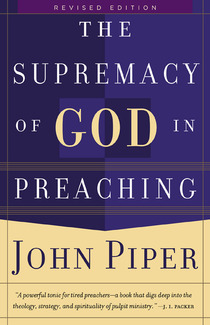
This book review of John Piper’s The Supremacy of God in Preaching was written as part of Pastor Lane’s doctoral course work, and as such, it is written in a more formal, academic tone than the rest of this blog’s posts. Still, we hope the audience will find these academic book reviews useful, which is why we have published them for your reference.
John Piper is Pastor for Preaching and Vision at Bethlehem Baptist Church in Minneapolis, Minnesota, where he has served in this role since 1980. He was born in Chattanooga, Tennessee, to a father that was a traveling evangelist and church planter and spent most of his growing up years in Greenville, South Carolina. He attended Wheaton College from 1964-1968, originally enrolling as a pre-med student but later changing to ministry major. He completed a Bachelor of Divinity at Fuller Theological Seminary, in Pasadena, California, and finished his doctoral study at the University of Munich, Germany. He is the author of numerous books; his most notable and definitive work is Desiring God: Meditations of a Christian Hedonist (1986). He is by far one of the leading influencers in modern Christianity today, and he is credited with much of the influence in and renewed popularity of the rise of Calvinistic theology. He is a professor, scholar, theologian, pastor, and poet, with active writings and ministry in all of these fields. He has recently announced a transition plan to step down as pastor at Bethlehem Baptist Church. It is quite a unique thing to live during a time to witness such a man of God of his stature.

Dr. Piper is, without question or apology, a conservative, evangelical, and passionate Calvinist. He is explicit to state and affirm his position in all his writings.
The purpose of this book can only be stated in Dr. Piper’s words,
My burden in these pages is to plead for the supremacy of God in preaching — that the dominant note of preaching be the freedom of God’s sovereign grace, that the unifying theme be the zeal that God has for his own glory, that the grand object of preaching be the infinite and inexhaustible being of God, and that the pervasive atmosphere of preaching be the holiness of God (23-24).
This is a grand and vast purpose for sure, but much great work toward accomplishing this goal is given in these pages. There is no doubt that the author’s target audience is those who are charged with preaching God’s Word. This book elevates the honor of preaching for the preacher, but also elevates the activity of preaching for anyone who would entertain to listen as well. A high standard is established for all that preaching is intended to be in the church.
The Supremacy of God in Preaching makes a significant contribution to the church, and specifically to preaching, by elevating the glory of God as the principle purpose in preaching, as this is reflected in the glad submission in the hearts of God’s people. This is a diversion from many contemporary theories of preaching that bend toward application orientation or practical insight. The only way to accomplish this goal is to continually make God supreme in all things thru the preaching event. This book is short, but packed with a powerful punch to contend for and compel the preacher toward this grand goal.
The structure of the content begins with four chapters contending for God’s supremacy in preaching based on God’s glory, Christ’s cross, Holy Spirit’s power, and the event of preaching. The second part of the book utilizes guidance from the preaching ministry of Jonathan Edwards. Dr. Piper begins by giving some biographical background on the life of this great preacher, sharing a basic framework of Edward’s theology, and then outlining the practices of his preaching.
The first section of the book lays a strong foundation upon which modern preaching rests. Using scriptural references, story, and historical preachers of the past, the author introduces this lofty goal of preaching with an overwhelming vision for all that it should be, but not in an unobtainable manner. God’s glory is to be celebrated by glad submission, not raw submission. The ground for this preaching rests in none other than the cross of Jesus Christ, the only answer for the righteousness of God, and the pride of man. The cross is both our validity for preaching in that it vindicates the righteousness of God and is our humility for preaching in that it kills the pride of both preacher and congregation. The Holy Spirit is the power of preaching in the gift of his Word and power. God has spoken and by that Word the Spirit speaks. Our dependence in preaching must be in nothing except the power and work of Holy Spirit. This first section is concluded by the concept of preaching from “gladness and gravity.” This simply means that a pastor must live and truly revel in a deep joy of intimacy (gladness) in God that comes through his preaching while never losing sight of the importance and urgency (gravity) of his work in preaching.
The second section of the book introduces the life, theology, and ministry, as well as the preaching of Jonathan Edwards, to demonstrate how this should be cultivated. This introduction to Edwards’s life is a stirring celebration of a great figure in preaching’s history and demonstrates a life given to godliness in every way. Edwards’s view of God was great and his preaching stemmed from this view. His purpose in preaching was to make much of this view of God. The author aims to show Edwards’s means of preaching through ten characteristics: stir up holy affections, enlighten the mind, saturate with Scripture, employ analogies and images, use threat and warning, plead for a response, probe the workings of the heart, yield to the Holy Spirit in prayer, be broken and tenderhearted, be intense. This is such a comprehensive approach to preaching as it fills a preacher’s heart and mind with revelation of God in his Word, depends upon Holy Spirit with a desperation, and utilizes every faculty of presentation possible to appeal to the listener’s imagination, head, and heart, and call for a response to Christ with boldness and intensity, but also tenderheartedness and a welcoming spirit.
How we need this type of renewed passion in preaching. I was trained and groomed in a professional model of preaching, and I have served under these types of preachers. While I would never claim there has been no value in this model, it is driven by accommodation to the medium of the day with a greater emphasis on reaching beyond the church and even elevating the preacher, and much too often failing to make preaching God’s Word the central event in Christian worship. In our current day this has evolved into “rockstar hero” preachers of the uber-gifted and heavily-resourced and made casual conversationalists of the masses, in order to “engage” people in the “what used to be called preaching but now has a much cooler term” event. This plays to the self-righteousness and pride, both in the pulpit and the pew, and stands in stark contrast to the author’s “ground of preaching,” the cross of Christ. Where the preaching is not vindicated in the righteousness of God through the cross, neither shall the people be. Where the preacher is not humbled through sin’s execution in the cross, neither shall the people be who are fed by it.
“Gladness and gravity should be woven together in the life and preaching of a pastor in such a way as to sober the careless soul and sweeten the burdens of the saints.” How accurately this statement reaches the heart of the matter for preaching. The preacher who is not glad in the gospel of Jesus Christ will never lead his people to be glad in it. The preacher who is not completely dependent upon the gospel of Jesus Christ will never boldly preach with gravity against sin and unrighteousness. The church is starving and malnourished, in desperate need of a renewed vigor for the supremacy of God in preaching. The life of the preacher matters for how the Word will be preached. If it is not a spring of living water for him, it will not refresh the listener by spilling over from him.
How challenging and convicting the seven practical suggestions from the author: strive for personal, earnest, glad-hearted holiness in every area of your life; make your life – especially the life of your study – a life of constant communion with God in prayer; read books that were written by men or women who bleed Bible when you prick them and who are blood-earnest about the truths they discuss; direct your mind often to the contemplation of death; consider the biblical teaching that as a preacher you will be judged with greater strictness; and consider the example of Jesus. These are both sobering in practice, and yet lead to a humility and courage through remembering and depending on the gospel of Jesus Christ.
I confess I often found myself teary and confirming, “Yes. Yes.” as I read. I was strongly moved time and time again for all my preaching to do nothing except demonstrate this pattern of faithfulness in preaching. My response to this book was very similar in my response to reading The Passion Driven Sermon by Jim Shaddix. With both of these books I sensed a compelling need to return often to read them, to be reminded of the great importance in preaching and to be encouraged to lay aside any value that I too often misplace on secondary aspects of the worship gathering and thereby recapture the primacy of faithfulness in preaching.
In reading this entire book I recognized the simplicity of its content and the depth to which it leads the reader. It is not a technically difficult book to comprehend, but the gravity of its message is overwhelming. It is sufficient for use with both beginner and advanced study students. The writing style of the author is straight-forward and simple, but not elementary. As with his other writings, he requires of me to slow down and take in each sentence to absorb the full impact. This type of style seems to me to be very conducive to the purpose and goal of this book. I wholeheartedly believe the author achieved his purpose in this book.
More book reviews by Pastor Lane: